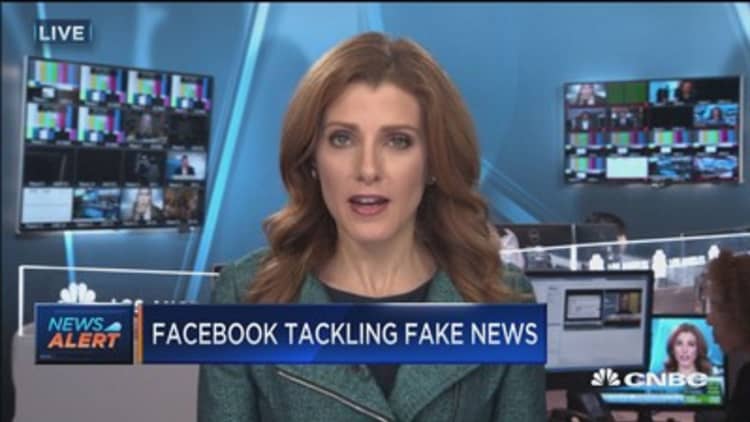
As Facebook faces ongoing questions about the role that fake news played in the election — and criticism for not doing enough to crack down on it — the social giant on Thursday is unveiling some new steps it's taking to address hoaxes and fake news.
Following up on a blog post that Mark Zuckerberg posted a few weeks ago, the company now says it's testing and starting to roll out some changes focused on "the worst of the worst, on the clear hoaxes spread by spammers for their own gain."
Most notably, Facebook is engaging its biggest asset — not its algorithms, but its users — to get the 1.8 billion people who use the platform to identify and call out fake stories. The company's rolling out tools that make it much easier to report hoaxes and mark news as fake.
And to make sure it doesn't get embroiled in questions about what's considered fake and real, Facebook will work with fact-checking organizations that are part of Poynter's International Fact-Checking Network. If the algorithm or users flag a story as questionable, it's sent to those organizations.
Once a story has been flagged as "disputed," it's linked to an explanation of why. Those questionable stories are deprioritized in users' news feeds, and perhaps most important, it can't be made into an ad and promoted.
Users can still share a fake article, but only if they click through a warning that the story is disputed. And Facebook is taking information about how consumers share articles to analyze if that article is somehow misleading. They're figuring out if it makes sense to incorporate that information into their news feed ranking.
To target the financial motivation driving fake news, Facebook is working to eliminate the financial payoff for spammers.
"Spammers make money by masquerading as well-known news organizations, and posting hoaxes that get people to visit to their sites, which are often mostly ads," Adam Mosseri, Facebook vice president of news feed, wrote in a blog post Thursday.
"So we're doing several things to reduce the financial incentives. On the buying side we've eliminated the ability to spoof domains, which will reduce the prevalence of sites that pretend to be real publications."
Facebook shares are down about 3 percent since the day after the election, bucking the broader market's dramatic gain over that period.
Wall Street analysts haven't connected fake news to pressure on the stock. And Facebook is certainly in good company among the other tech names that have not participated in the rally — there are plenty of questions about how Trump's opposition to net neutrality could raise costs for Facebook and other video-focused companies.
But there's no question that this is a topic that Facebook would like to erase from its news feed, and from headlines about the company.


